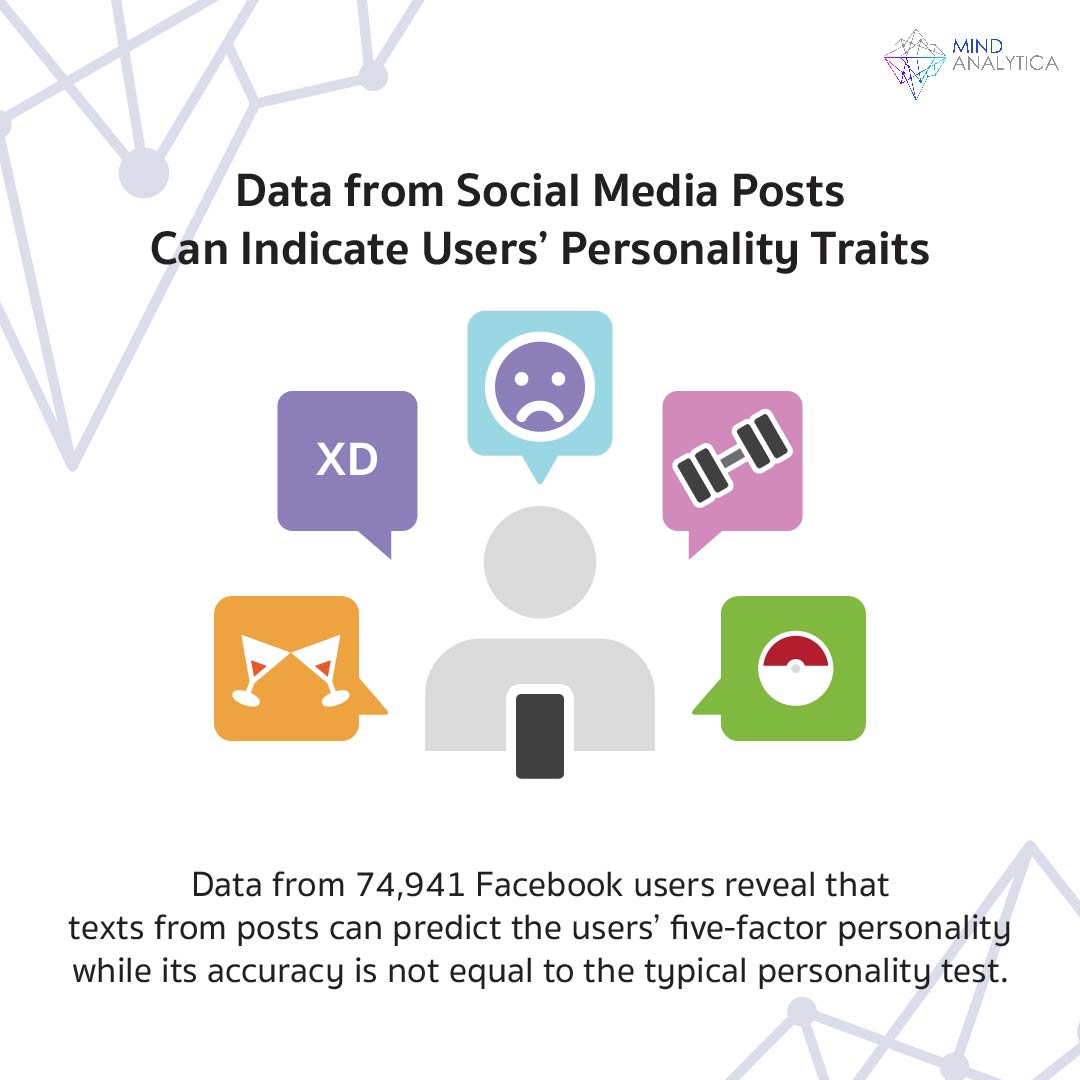Data from Social Media Posts Can Indicate Users’ Personality Traits
22 พฤษภาคม 2566 - เวลาอ่าน 4 นาที
Personality is a term used to describe the behavioral patterns of individuals. For example, if a person tends to enjoy meeting friends, socializing often, and engaging in challenging activities, they would be referred to as having an extroverted personality. Personality can be measured and assessed using various methods. The most popular method is through personality questionnaires. In addition, psychologists studying personality have developed new methods for assessing personality. One current example is the use of data from social media, which can collect a large amount of individual behaviors over time. Psychologists hypothesize that if the patterns of behavior recorded on social media can be analyzed, it may be possible to assess an individual's personality.
One pioneering research in analyzing personality through social media is the work of Schwartz in 2013. His research team obtained data from 74,941 Facebook users who agreed to grant access to their Facebook information. They conducted personality tests and then grouped the text from each user's Facebook posts into keywords. They then examined the relationships between these keywords and various personality traits, discovering significant correlations.
- Extroverts often used words like "party," "can't wait," "love you," and "amazing."
- Introverts, the opposite of extroverts, used terms like "anime," "Pokemon," "internet," "manga," and various emoticons like xD, >_<.
- Emotionally sensitive individuals used phrases like "sick of," "depressed," and "I hate,"
- Emotionally stable people used words like "success," "basketball," "beautiful day," and "workout."
This work can serve as a prototype for researchers in the field of personality assessment using social media data, particularly in the selection of personnel. However, a certain research study that utilized text data from social media to examine its correlation with personality test scores found a low to moderate level of relationship. In other words, the effectiveness of social media in replacing personality tests is still limited. The relationship between analyzed social media text and job performance (or other criteria such as helping colleagues) is weaker compared to the relationship between scores from conventional personality tests and job performance. Nevertheless, the analyzed scores from social media still exhibit stronger relationships with certain variables, such as job satisfaction, compared to conventional personality tests. Despite having lower predictive power for job performance, social media data is still popular in personnel selection in various cases because test takers do not need to spend time answering questions, and they can manipulate their responses to present a better image of themselves, which is more difficult to achieve in reality.
There are several possible reasons why textual data on social media cannot accurately measure personality as effectively as conventional personality tests. For example, some individuals use social media less frequently, or they may only use it for consuming content without engaging in communication or posting text. People have different reasons for using social media, such as seeking information or entertainment. Furthermore, social media data is presented in various formats across different platforms, such as Facebook, Instagram, TikTok, Twitter, and Line, each with its posting methods and purposes. The nature of social media does not capture every possible behavior that users engage in. Certain behaviors, like responsibility in work and education, may not be adequately reflected on social media. In summary, the accuracy and completeness of individual behavior data depend on the number of behaviors expressed through social media. Some individuals express themselves more, while others are less inclined to do so, resulting in variations in measurement standards and reflections of personality.
However, it is important to note that the research study only covers textual data. If researchers can incorporate other types of data produced by users, such as images and videos, which may indicate personality traits to a greater extent (e.g., people who frequently post pictures with friends versus those who post scenic views), along with factors like visiting different pages, liking content, and tagging friends, these can be used to predict personality as well. Therefore, even though current research suggests that conventional personality tests are still more effective, advancements in text analysis techniques and increased data collection from various sources may enhance the accuracy of personality assessments derived from social media, reflecting reality to a greater extent.
Practical applications. When implementing the use of social media data, organizations should consider the extent to which the analyzed scores reflect the desired measurements before applying them. Additionally, using social media involves accessing personal data, particularly sensitive information that individuals may not have intentionally made public. This can make applicants uncomfortable about disclosing such information. Applicants should understand their rights and realize that it is not necessary to disclose personal information that has not been publicly shared from the beginning. If disclosure becomes necessary, applicants have the right to modify their own social media content. For example, if most of their posts contain negative language, applicants have the right to amend them before sharing them with others for evaluation.
Our services. MindAnalytica offers psychological analysis and other variables using social media data in the Thai language version. These services cover data collection, AI model training, and result interpretation using statistical principles and data science. The aim is to provide accurate, reliable, and user-friendly results for psychological assessments.



